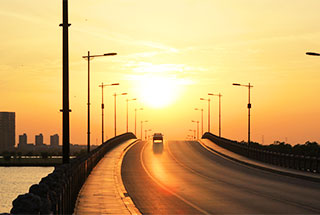

All-in-one Solar Light uses crystalline silicon solar cells for power supply, stores electric energy in batteries (gel batteries, sealed lead-acid batteries, gel batteries, lithium iron phosphate batteries), uses ultra-high brightness LED lights as light sources, and is controlled by an intelligent charge and discharge controller to replace traditional public power lighting street lamps.
LED street lamp (including light source)
Solar panel
Battery
All-in-one Solar Light Controller
Streetlight pole (including foundation, solar panel bracket)
Auxiliary materials such as wires and other parts
Solar cell modules generally use monocrystalline silicon or polycrystalline silicon solar cell modules; LED lamp heads generally use high-power LED light sources; controllers are generally placed inside the lamp pole, with light control, time control, overcharge and overdischarge protection, and reverse connection protection. More advanced controllers also have functions such as seasonal adjustment of lighting time, half-power functions, and intelligent charge and discharge functions. The battery is generally placed underground or has a special battery insulation box and can use valve-regulated lead-acid batteries, gel batteries, iron-aluminium batteries or lithium batteries. Solar lamps work fully automatically, without the need for trenching and cabling, but the lamp pole needs to be installed on embedded parts (concrete base).
Using the principle of the photovoltaic effect, solar cells made of this principle will receive solar radiation energy and convert it into electrical energy output during the day through the solar panel, and store it in the battery through the charge and discharge controller. When the open circuit voltage of the solar panel is lower than the set value in the evening, the charge and discharge controller detects this voltage value and acts, allowing the battery to discharge to the lamp head. The battery stops discharging after a set period or the controller detects daytime, ending the discharging process. The controller then waits for dawn or starts the charging process.
All-in-one Solar Light is usually not affected in winter. However, in snowy weather, it may be significantly impacted, especially in the three northeastern provinces. In winter, when there is heavy snow, the solar panel might be covered, and thick snowflakes can block the panel from receiving sunlight, which may cause the LED to not light up. All-in-one Solar Light does not convert a certain amount of heat into electricity for road lighting. However, to ensure the LED All-in-one Solar Light works normally in winter, one can manually or mechanically clean the panels when there is snow accumulation.
Long-term neglect of cleaning the solar panel can lead to significant dust accumulation, affecting power generation. In some areas, snow often covers the solar panel, resulting in insufficient power generation.
When the All-in-one Solar Light reaches a certain usage period, if the battery still undergoes charge and discharge cycles, as the usage time increases, the power consumption will also increase. Generally, the LED All-in-one Solar Light will have shorter lighting durations day by day after exceeding its service life. This is normal, and the battery usually needs timely replacement in such cases.
To avoid freezing: When selecting a solar panel, choose products with good processing quality, fewer seams, and fewer welding points. The solar panel should be simple and clean, and also moisture-proof, to prevent freezing. To avoid freezing in cold regions' LED All-in-one Solar Light. It is well known that cold regions often experience rainy and snowy weather. Such weather can easily cause the streetlights to freeze, because the All-in-one Solar Light relies on the solar panel to collect solar energy for power generation. If the panel is frozen, it will cause the LED All-in-one Solar Light to malfunction, requiring timely maintenance.